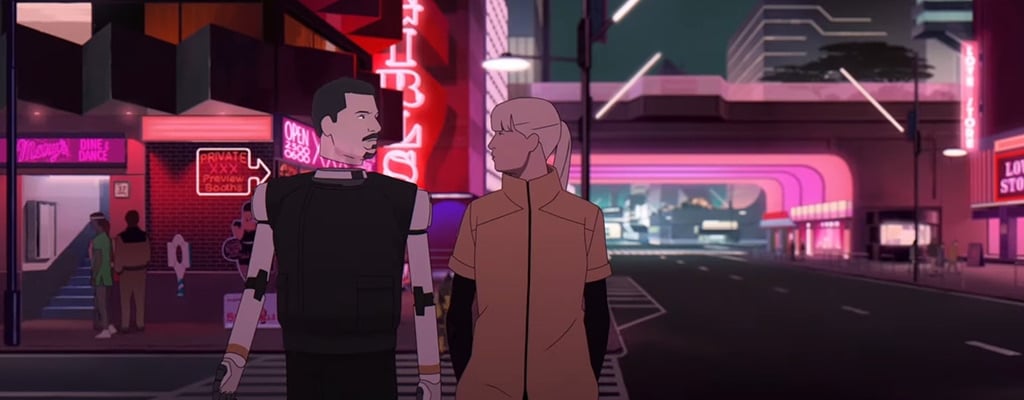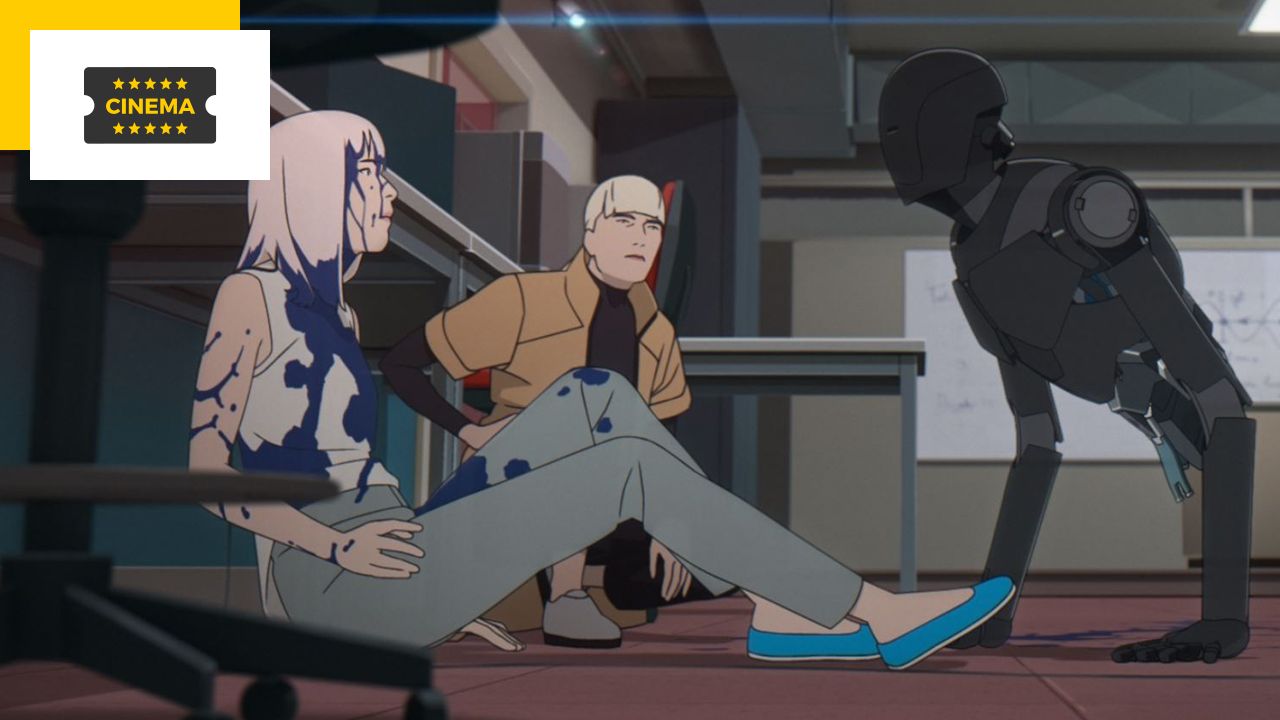Aliens at the Crossroads of Genres
On the human-colonized planet Mars, detective Aline Ruby, played by Lea Drucker, searches for a missing young cybernetics student. His progress in this unusual business leads him into a vicious and nasty spiral, the outcome of which could upset the fate of the entire galaxy…
Unexplained disappearances, spectacular chases, android duels… A hybrid French creation, Mars Express is placed halfway between avant-garde science fiction and a (very) dark film. Presented at the Cannes and Annecy festivals, this animated gem stands out for its position at the crossroads of genres and an original visual style reminiscent of the best graphic novels of anticipation.
From his inspirations to the role of artificial intelligence (AI) in art, director Jeremy Perrin spoke to AlloCiné about his project. So, before you embark on an unforgettable journey into space (and the future), your captain will explain the program and reveal all the secrets of Mars Express!
AlloCiné: What was your starting point for presenting Mars Express?
Jeremy Perrin: It was a desire for a more pragmatic sci-fi that came from a lack at the time we were writing the film. We are surrounded by SF in the cinematic landscape, but this is fantastical, even magical SF, where metaphor is more important than science. I like it, but Laurent Sarfat (co-writer) and I have been missing a bit more credible sci-fi.
We needed a script, obviously, and a world. At that time, the utopias and fantasies of tech billionaires who wanted to live in space to escape global warming and future wars were already relevant, which inspired us as well.
What role did you play in choosing the artists? What steps did you take to bring the characters you created to life?
Jeremy Perrin: Actually, there really wasn’t one! I love bringing people into animation who aren’t used to working there yet. The producer, Didier Creste, wanted to have headliners, which would not be a problem for me as long as we found the right headliners. I only needed actors whose voices carried charisma, allowing the characters to be recognized simply by their voice.
I found Leah Drucker Impressive up to Guard, but he’s also talented in the comedic register. I thought this super wide range was perfect for Aline. Mathieu Amalric has played bad guys before, so I laughed, especially since he’s a great actor with a unique and interesting voice.
It’s a completely different kind of acting, where the body is removed and all the focus is on the voice. It’s a different approach to work and everything is done very quickly. I talked about their characters over the phone, but the recording was done immediately. In a similar voice-making situation, we need the sounds before the animation to be lip-synced, lip-syncing movement on the labials.
Why did you choose to combine film noir and science fiction? Why do you think these two cinematic genres go so well together?
Jeremy Perrin: Detectives are very present on television, with many investigative series. If this marriage works, it’s because in science fiction, as in film noir, it’s the search for truth that resonates. The audience tries to understand the science fiction world while the characters try to uncover the truth behind the crime.
We have come to rely heavily on this type of interconnection because of the technology and social relationships of the futuristic world Mars Express Not explained by dialogue. Viewers have to analyze them, decipher them using clues, and thus wonder about the world they discover as the investigation unfolds.
This futuristic world is full of details and technology. How do you imagine them?
Jeremy Perrin: We met specialists, programmers, planetologists… The film featured a car designer who, together with his teams, fully designed the car used by Alin and his partner Carlos (Daniel Njo Lobe). They made realistic 3D versions of him and there was even talk of making a life size statue of him, we were like crazy even if that never happened!
We were surrounded by people who had better experience than us and who could provide ideas. If we had not met them, we would undoubtedly have the reflex, as in other films, to repeat what we have already seen. These discussions taught us how to use these objects.

What was your inspiration? is inside Mars Express Lots of references to Blade Runner, but also Japanese animation (A ghost in a shell, Pluto). Is this a world you feel close to?
Jeremy Perrin: Of course ! I bathed in it, even if I have a little time, I still bathe. I started recently Pluto, which Mars Express joins on several topics. We have the same references, these are the themes that SF has been echoing for a long time and that still resonate today.
What is your favorite animated movie? Do you think he inspired you for Mars Express?
Jeremy Perrin: There are a few movies I like to watch regularly: Ninja Scroll, Patlabor, Cyber City Oedo 808… These movies are the result of an era, so some have aged badly, but I still have a fondness for them today. Most recently, I was blown away by the Tengoku Daimakyo series, whose post-apocalyptic “youth” register refreshes the genre.
Akira and Moebius indirectly influenced my work with their realistic yet very sophisticated style. This also applies to all the “children” of this cinematography: memories, Satoshi Kon’s films… I like these animators and directors who worked on stylized photorealism, this utopian desire without touching reality, but which still leaves the impression of reality.
Animation is sometimes considered a genre aimed at young adults. Want to check out Mars Express, an animated movie theater aimed mostly at adults?
Jeremy Perrin: Totally, that’s the whole intention. There are already more adult French animated films, we can think of Persepolis for example, or I lost my body, but I wanted to add to this the specificity of a genre film, here SF. Adult animation is often accepted when it is historical, social, or political. This is all very well, but I think the spectrum could be expanded by bringing in, for example, adventure, horror or science fiction.

In your film, a lot of space is devoted to androids and artificial intelligence. How do you feel about using them, especially in animation? Do you think they are useful or dangerous for artists?
Jeremy Perrin: I’m in the middle! I think the only mistake would be to be afraid of it. Now that they exist, AIs need to be worked on to see what we can do with them. They can become utilitarian, practical. The idea could be an AI disconnected from the Internet that would not steal anyone else’s work, but would shut down and feed only on its user’s work to save time.
But the time saved could be the reason for tighter budgets and build timelines, which will put pressure on production teams…that’s a tough debate!
The Mars Express, by Jeremy Perrin, is in theaters today.
Source: Allocine
Rose James is a Gossipify movie and series reviewer known for her in-depth analysis and unique perspective on the latest releases. With a background in film studies, she provides engaging and informative reviews, and keeps readers up to date with industry trends and emerging talents.









